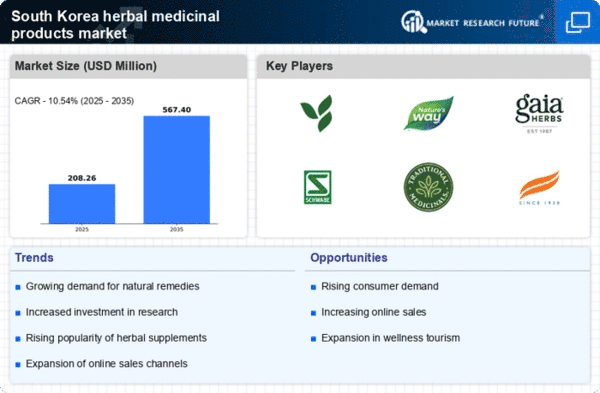Growing Consumer Awareness
The herbal medicinal-products market in South Korea is experiencing a notable increase in consumer awareness regarding the benefits of natural remedies. This heightened awareness is largely driven by a shift towards holistic health approaches, where individuals seek alternatives to synthetic pharmaceuticals. Recent surveys indicate that approximately 65% of South Koreans prefer herbal products for their perceived safety and efficacy. This trend is further supported by educational campaigns and social media influencers promoting herbal remedies, which have significantly contributed to the market's growth. As consumers become more informed about the potential health benefits of herbal products, the demand for these items is likely to continue rising, thereby enhancing the overall market landscape.
Expansion of E-commerce Platforms
The herbal medicinal-products market is witnessing a significant transformation due to the expansion of e-commerce platforms in South Korea. With the rise of online shopping, consumers now have easier access to a wide range of herbal products, which has contributed to increased sales. Data shows that online sales of herbal products have surged by approximately 40% in the past year, indicating a shift in consumer purchasing behavior. This trend is likely to continue as more consumers prefer the convenience of online shopping, coupled with the ability to compare products and read reviews. As a result, businesses are increasingly investing in their online presence to capture this growing segment of the market.
Rising Interest in Sustainable Practices
Sustainability is becoming a pivotal concern for consumers in South Korea, influencing their purchasing decisions in the herbal medicinal-products market. As awareness of environmental issues grows, consumers are increasingly favoring products that are sustainably sourced and produced. This trend is reflected in the market, where companies that prioritize eco-friendly practices are gaining a competitive edge. For instance, a recent study indicated that around 70% of consumers are willing to pay a premium for sustainably produced herbal products. This shift towards sustainability not only enhances brand loyalty but also encourages innovation in product development, as companies strive to meet the evolving expectations of environmentally conscious consumers.
Aging Population and Health Consciousness
The demographic shift towards an aging population in South Korea is a critical driver for the herbal medicinal-products market. With an increasing number of individuals aged 65 and above, there is a growing focus on preventive healthcare and natural treatments. This demographic is particularly inclined towards herbal remedies, as they often seek alternatives to conventional medicine for managing chronic conditions. Reports suggest that the elderly population is projected to reach 20% by 2025, which could lead to a substantial increase in the demand for herbal products. Consequently, this trend is likely to shape the market dynamics, as companies adapt their offerings to cater to the specific needs of older consumers.
Cultural Heritage and Traditional Practices
The rich cultural heritage of South Korea plays a significant role in shaping the herbal medicinal-products market. Traditional practices, such as the use of herbal medicine in Korean traditional medicine (KTM), continue to influence consumer preferences. Many South Koreans view herbal remedies as integral to their cultural identity, leading to sustained interest in these products. Recent data suggests that approximately 55% of consumers regularly use herbal remedies based on traditional knowledge. This cultural inclination not only supports the market's growth but also encourages the integration of traditional practices with modern scientific research, potentially leading to innovative product offerings that resonate with both traditional and contemporary consumers.
















Leave a Comment